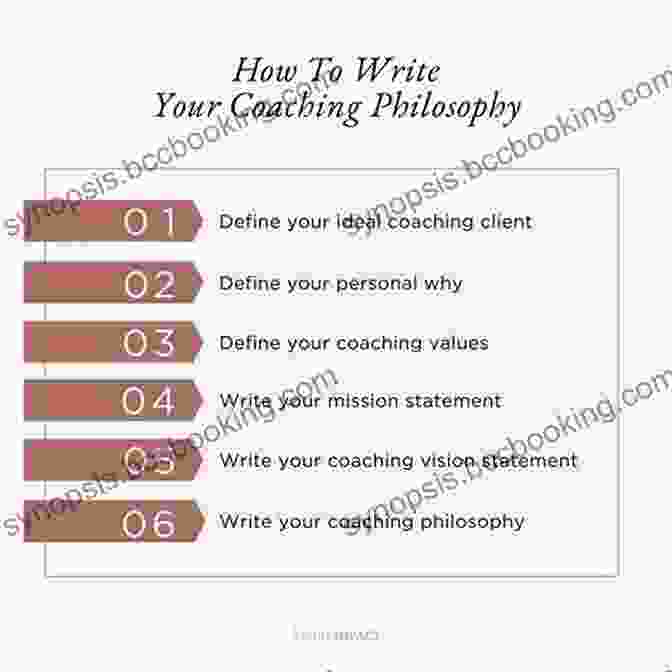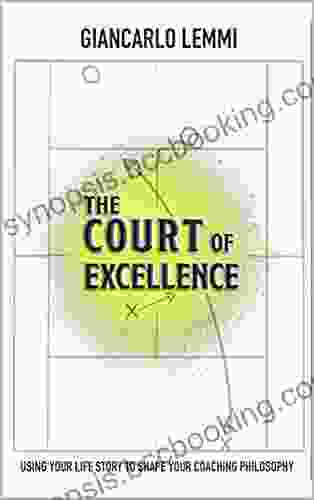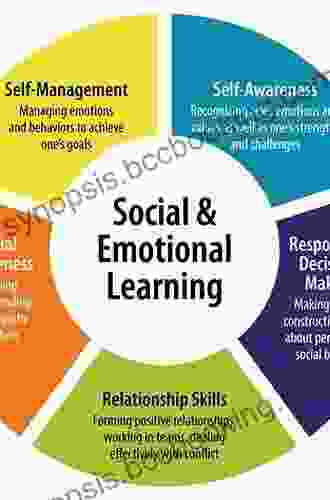The Court Of Excellence: Using Your Life Story To Shape Your Coaching Philosophy


Unleashing the Power of Personal Narrative in Coaching
In the realm of coaching, finding your unique voice and developing a philosophy that authentically reflects your values and experiences are essential. While theories and techniques provide a solid foundation, it is your own life story that holds the key to unlocking a transformative and profound coaching experience.
5 out of 5
| Language | : | English |
| File size | : | 3775 KB |
| Print length | : | 108 pages |
| Lending | : | Enabled |
| Screen Reader | : | Supported |
Your personal journey, with its triumphs and tribulations, has shaped who you are as a person and a coach. By embracing your experiences and weaving them into your coaching philosophy, you can create a powerful narrative that resonates with clients on a deep level.
The Art of Storytelling in Coaching
Storytelling is an integral part of human connection. As coaches, we have the privilege of holding space for our clients' stories, allowing them to unfold their experiences and discover their own truths. By sharing relevant aspects of our own life stories, we can create a bridge of vulnerability and empathy, fostering a genuine connection that empowers clients to embark on their personal journeys.
When used strategically, storytelling can:
- Build rapport and trust with clients
- Demonstrate your understanding of their challenges
- Promote self-reflection and growth
li>Provide inspiration and hope
Crafting Your Coaching Philosophy
Your coaching philosophy is the guiding force that shapes your approach to coaching. It encapsulates your beliefs, values, and principles that guide your interactions with clients. To develop a philosophy that is uniquely yours, consider the following steps:
1. Reflect on Your Life Journey
Take time to reflect on your life experiences, both personal and professional. Identify the significant moments that have shaped your values, beliefs, and perspectives. These experiences may include challenges you have overcome, successes you have achieved, and relationships that have influenced you.
2. Identify Common Themes
Once you have identified your key life experiences, look for common themes that emerge. What are the underlying values and principles that have guided your actions and choices? These themes will form the foundation of your coaching philosophy.
3. Articulate Your Beliefs
Based on the common themes you have identified, articulate your beliefs about coaching and the role you play in the lives of your clients. What do you believe about human potential, growth, and change? How do you envision your clients reaching their goals?
4. Define Your Values
Values are the core principles that guide your behavior and decisions. Identify the values that are most important to you in your work as a coach. These values will shape how you interact with clients and the way you conduct your coaching sessions.
5. Create a Statement
Finally, consolidate your beliefs, values, and principles into a concise statement that encapsulates your coaching philosophy. This statement will serve as a guide for your coaching practice and a source of inspiration for your clients.
Examples of Inspiring Coaching Philosophies
To illustrate the power of personal narrative in shaping coaching philosophies, here are two inspiring examples:
1. The Resilience Coach
A coach who experienced adversity early in life might develop a philosophy centered around resilience and overcoming obstacles. They might use their personal story to demonstrate the importance of perseverance, adaptability, and finding strength in challenges.
2. The Purpose-Driven Coach
A coach who has a deep understanding of their own purpose might develop a philosophy focused on helping clients discover their unique passions and values. They might use their own journey of self-discovery to guide clients in identifying their life's purpose and creating a fulfilling path.
The Impact of a Meaningful Philosophy
A well-crafted coaching philosophy that is rooted in your life story can have a profound impact on your coaching practice:
1. Authenticity and Credibility
When you coach from a place of authenticity, your clients can sense your genuine desire to help them. Sharing your own experiences and values builds trust and credibility, allowing you to connect with clients on a deeper level.
2. Relevance and Impact
By weaving your personal narrative into your coaching, you create a coaching experience that is relevant and impactful for your clients. Your stories and insights can resonate with their own experiences, providing valuable perspectives and guidance.
3. Inspiration and Empowerment
Your life story can serve as an inspiration to your clients, showing them that they can overcome challenges, achieve their goals, and live a fulfilling life. Your coaching empowers them to believe in themselves and take action towards their dreams.
4. Professional Development
Reflecting on your life story and developing your coaching philosophy is an ongoing process of professional development. As you grow and evolve, your philosophy will adapt to reflect your changing experiences and perspectives.
Your life story is a treasure trove of wisdom and experience that can profoundly shape your coaching philosophy. By embracing your personal narrative, you can create a coaching approach that is authentic, impactful, and transformative for your clients. Through the power of storytelling and self-reflection, you can unlock your coaching potential and guide your clients toward a life of purpose, fulfillment, and success.
5 out of 5
| Language | : | English |
| File size | : | 3775 KB |
| Print length | : | 108 pages |
| Lending | : | Enabled |
| Screen Reader | : | Supported |
Do you want to contribute by writing guest posts on this blog?
Please contact us and send us a resume of previous articles that you have written.
 Book
Book Novel
Novel Page
Page Chapter
Chapter Text
Text Story
Story Genre
Genre Reader
Reader Library
Library Paperback
Paperback E-book
E-book Magazine
Magazine Newspaper
Newspaper Paragraph
Paragraph Sentence
Sentence Bookmark
Bookmark Shelf
Shelf Glossary
Glossary Bibliography
Bibliography Foreword
Foreword Preface
Preface Synopsis
Synopsis Annotation
Annotation Footnote
Footnote Manuscript
Manuscript Scroll
Scroll Codex
Codex Tome
Tome Bestseller
Bestseller Classics
Classics Library card
Library card Narrative
Narrative Biography
Biography Autobiography
Autobiography Memoir
Memoir Reference
Reference Encyclopedia
Encyclopedia Frederick Joseph
Frederick Joseph M I Ogumefu
M I Ogumefu Peter Lasalle
Peter Lasalle Gerri Leen
Gerri Leen Heath Stallcup
Heath Stallcup Hans Thies Lehmann
Hans Thies Lehmann Mantak Chia
Mantak Chia James A Cashin
James A Cashin Douglas T Hall
Douglas T Hall Herbert L Roitblat
Herbert L Roitblat Gayle Tzemach Lemmon
Gayle Tzemach Lemmon Deborah Heiligman
Deborah Heiligman George T Arnold
George T Arnold Scott Freeman
Scott Freeman Michael Powell
Michael Powell Geoff Kersey
Geoff Kersey Lyle Estill
Lyle Estill Gary A Linderer
Gary A Linderer Tim Federle
Tim Federle Gill Barron
Gill Barron
Light bulbAdvertise smarter! Our strategic ad space ensures maximum exposure. Reserve your spot today!

 John SteinbeckPocket History for Kids: The Ultimate Guide to World History, from Ancient...
John SteinbeckPocket History for Kids: The Ultimate Guide to World History, from Ancient... Robert ReedFollow ·14k
Robert ReedFollow ·14k David Foster WallaceFollow ·9.3k
David Foster WallaceFollow ·9.3k Gene SimmonsFollow ·8.5k
Gene SimmonsFollow ·8.5k Duncan CoxFollow ·18.5k
Duncan CoxFollow ·18.5k Gabriel HayesFollow ·8.1k
Gabriel HayesFollow ·8.1k Tony CarterFollow ·2k
Tony CarterFollow ·2k José MartíFollow ·11.1k
José MartíFollow ·11.1k Guy PowellFollow ·14.4k
Guy PowellFollow ·14.4k

 Robert Heinlein
Robert HeinleinUnveiling Humanism in China and the West: A Journey...
In our rapidly...

 Brian Bell
Brian BellBlind Boy's Unwavering Struggle Against Abuse and the...
In the tapestry of...

 Craig Carter
Craig CarterBuilding Wealth While Working for Uncle Sam: The Ultimate...
## ### Are you a federal employee who wants...

 Raymond Parker
Raymond ParkerUnveiling the Secrets of Arabic Survival: The Ultimate...
Embarking on a journey to unravel the...
5 out of 5
| Language | : | English |
| File size | : | 3775 KB |
| Print length | : | 108 pages |
| Lending | : | Enabled |
| Screen Reader | : | Supported |














